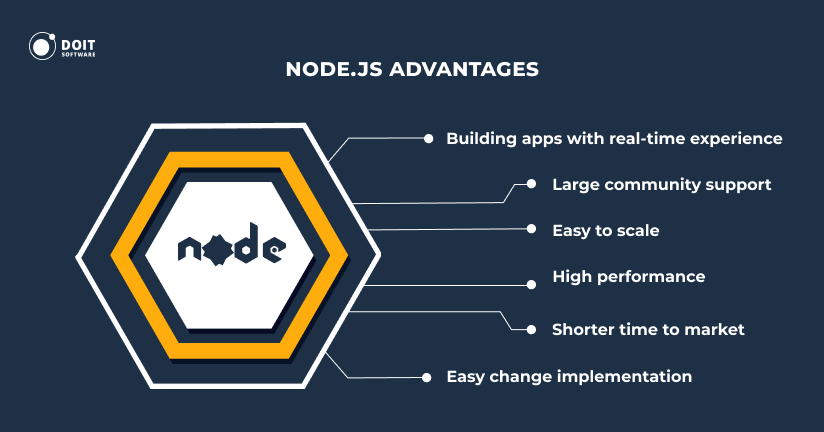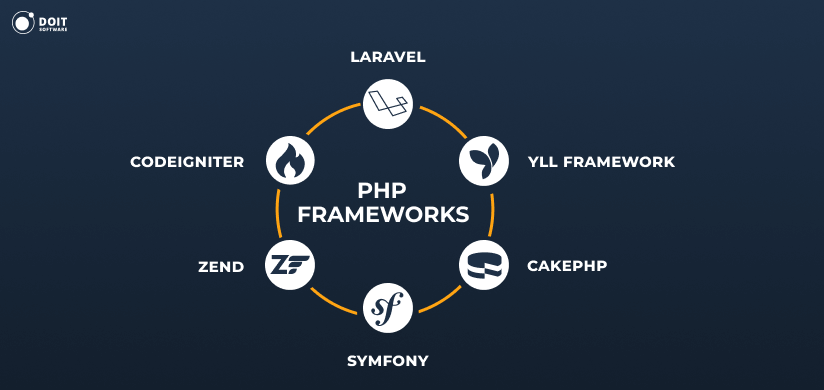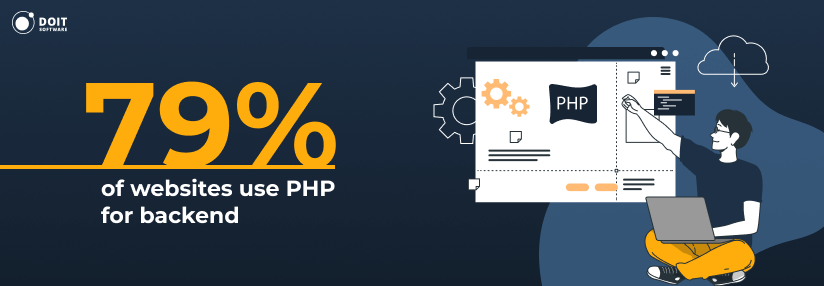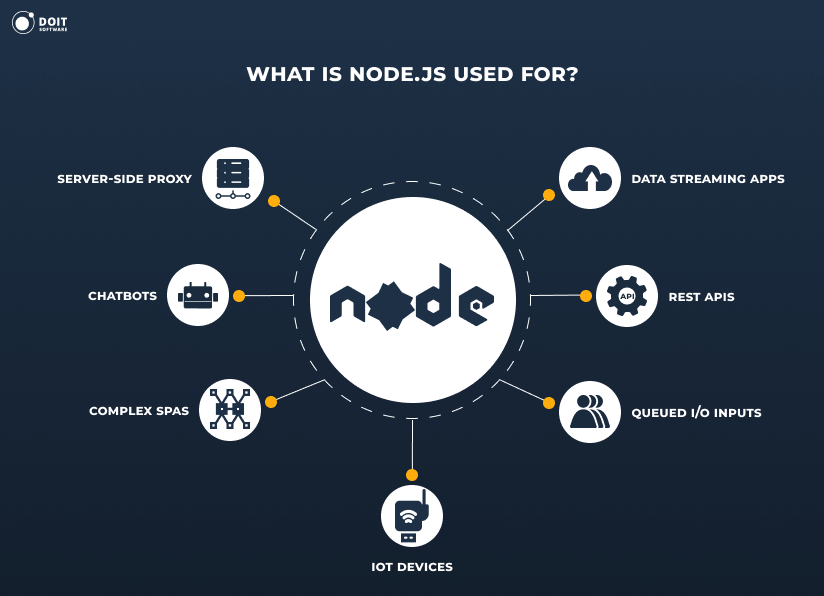JavaScript and PHP are both the largest programming languages in the world with 67.7% and 26.2% respectively. Before Node.JS came around, JavaScript was no competition to PHP and was used solely for frontend development. In fact, the languages worked in tandem: JavaScript was a technology for building frontend and PHP was used for the server-side. What has changed? Why are we comparing Node.JS vs PHP?
In 2009, JavaScript launched its own backend technology called Node.JS and disrupted the development market. Nowadays, coders compare the two technologies, trying to decide which one is better. In reality, both Node.JS and PHP have their benefits and drawbacks, which we will discuss further in this article. PHP vs Node.js: how to choose the right technology for your next project?
In this section, we will take a deeper look at Node.JS and its pros and cons for your business. What are Node.js alternatives and why is it becoming a popular choice within the software development community?
Node.JS is a JavaScript runtime environment. Using the V8 JS engine, Node.JS delivers apps with high performance and stability. This technology also provides access to a range of asynchronous I/O primitives, which makes applications more responsive. Finally, Node.JS simplifies software development for thousands of coders as they can create both server and client sides of the app using one language, JavaScript.

Is Node capable of evolving into a PHP replacement or is it just an alternative? What makes Node.js so great and popular among developers?
Nothing is perfect and neither is Node.js. We will not go through each and every disadvantage of the technology, but rather focus on the most crucial reasons for opting not to use Node.js.
As the goal of this piece is to compare Node.js vs PHP, in this part we will shift our focus toward the advantages of PHP along with its drawbacks. What is PHP used for and how does it benefit your business?
PHP is the biggest Node.js alternative and is considered one of the best server-side languages in the world. Survey from W3Tech shows that 79% of websites use PHP for their backend compared to the 1.4% that use Node.js, the JavaScript runtime environment. Being a general-purpose backend technology, PHP is mostly used for web development. This language has a large support of frameworks such as Laravel and Symfony that are open source and can be used by anyone.

How can PHP benefit your business and put you ahead of the competition? Why is PHP such a popular language and who wins in the battle between Nodejs vs. PHP?
What are the disadvantages of PHP that drive coders away from this technology?
We have created a quick overview of the PHP vs Node comparison where we take a look at seven aspects of backend technologies and determine the winner.

Node js vs PHP: which is better?
Coding
More code
Less code
Speed
Node.JS is faster due to asynchronous execution
Synchronous execution makes PHP slower
Performance
Node.JS shows high performance due to the concurrency feature
Pairing up with HHVM Virtual Machine makes PHP performance better but Node.JS is still superior
Database
Node.JS allows working with any database type: MongoDB, PostgreSQL, CouchDB, SQLite, Redis, etc.
PHP is great with relational and conventional databases: MongoDB, Redis, MySQL, PostGreSQL, SYBASE, Oracle, etc.
Community
Community is relatively small but active
PHP has a bigger online community
Hosting
Node.JS is compatible with many hosting providers: Bluehost, HostGator, Hostinger, etc.
PHP has a wide compatibility with hosting providers: Bluehost, HostGator, Hostinger, SiteGround, iPage, etc.
This aspect is contingent on the syntax that either language allows you to write fewer code lines or does not. The simpler and better engineered is the syntax of a language, the less code you will have to write to execute the program.
Node.JS requires way more code lines to execute the same functionality as PHP. Although you will be operating in a single development environment with JavaScript, which simplifies the learning curve, Node.JS apps are written with more code. PHP, on the other hand, operates with fewer lines but requires you to learn the LAMP stack in order to write apps. In PHP vs Nodejs coding, PHP is a clear winner.
Speed is a vital factor in deciding when to use Node.js or PHP. Node.JS is asynchronous and PHP is synchronous, but what does this mean? Synchronous code is executed line by line, whereby the line will not be processed before the previous line has been successfully executed. Asynchronous code allows simultaneous code execution without waiting for previous lines. This distinction is very important and makes one language fast and the other rather slow and cumbersome.
Node’s asynchronous nature gives it a huge competitive edge as it reduces downtime and allows for a better user experience. PHP operates with synchronous code which labels it an outdated technology. In PHP vs Node.js speed, Node is the definite winner.
Performance is one of the most significant metrics in app evaluation as it impacts the user experience. It addresses the way the code was written using Node.js and PHP, as well as performance KPIs including page load and UX/UI design.
As we have mentioned before, Node.js operates asynchronously as well as utilizes the Chrome V8 engine, which accelerates the execution and drastically improves performance. JavaScript is also event-driven, which does not freeze new requests until the old ones are finished. Paired up with Node’s concurrency, JS creates a great environment to create well-functioning applications with incredible performance levels.
PHP is an older technology that does not provide concurrency and blocks new requests until it finishes existing ones. This feature slows down the entire system and negatively impacts on the user experience. However, PHP can be used with HHVM which will boost your performance, yet remain slightly inferior to Node: in Node.js vs PHP performance, Node still wins.
Your database needs also to play an important role in choosing when to use PHP vs JavaScript. The ability of the technology to hook up to the right database type, conventional or relational, will steer you in the direction of the right language. But what is the difference? Conventional databases store data hierarchically, whereas relational databases save data using tables, which makes it a convenient format for detecting relationships. Finally, there are NoSQL databases that keep data in formats such as documents, graphs, key pairs and so on.
Node.js supports a wide range of databases, including NoSQL ones like MongoDB. Besides, Node certainly works well with conventional and relational databases, even with complex ones like graph databases. PHP cooperates well with conventional and relational databases such as MySQL, however, working with NoSQL is difficult. Setting up NoSQL with PHP is lengthy, tedious and complicated. In PHP vs Node.js databases, Node takes the lead.
Another crucial aspect of any technology including Node.js or PHP is the community behind it. Community contributes to libraries and frameworks to keep the technology relevant and give it a competitive edge. Besides, a loyal community creates discussions on GitHub and other tech portals to answer questions and resolve difficult cases. Finally, communities are shaped by your potential employers, and when they are big and ambitious, your project will be sure to win.
Considering that PHP has been around since 1994 and has proven to be a reliable and successful technology, it has a much larger community. Thanks to WordPress, which supports millions of websites and uses PHP for its backend, the technology has become insanely popular. In PHP vs Node.JS, PHP is the clear winner with 26% on Statista. Node.js is a relatively new technology that was launched in 2009. Even though Node is a very popular backend tool that has been gaining more and more traction, the community is smaller. At the same time, Node’s projects are newer and more relevant to current developers. Still, in the PHP vs Node.js community comparison, PHP is the leader.
Your choice of technology determines your access to different hosting providers. Depending on the selected provider, your development costs, expenses, speed, and security might be affected. Which technology wins in Node.js vs PHP security and hosting?
As mentioned earlier, PHP powers 79% of all websites. PHP is compatible with an exhaustive number of hosting providers which makes it a great choice. However, PHP lacks in ensuring a high grade of security, a vital aspect of any technology. Node.JS offers some compatibility, but it is far less diverse compared to Nodejs vs PHP.

PHP: Facebook, Wikipedia, WordPress, Yahoo!, Tumblr, MailChimp, etc.
Node.js: PayPal, Netflix, Linkedin, Uber, eBay, Mozilla, etc.
After everything we have learned about PHP vs Node.JS, their benefits and disadvantages, which technology is better? Has Node.js become a great alternative to PHP over the years, or do the disadvantages still outweigh the Node js advantages? The truth is that your choice also depends on the project and industry. When should I use Node.JS vs PHP?

Node.js is the perfect choice when you build dynamic single-page applications using Angular, React and JQuery for the frontend. Node is a part of the MEAN stack (MongoDB, Express.js, Angular and Node.js), MERN, MEVN, which is why its usage makes sense if your stack consists of these tools.
Node.js can single-handedly support IoT devices such as fitness trackers, drones and even robots as well as heavy data streaming platforms. Being able to manage multiple concurrent processes, Node is also used for collaborative business management tools like Trello.
PHP is a good pick for a blog or eCommerce project that requires many integrations. PHP is a part of the LAMP stack (Linux, Apache or Nginx, MySQL, and PHP), so including it to your stack if you are already using these technologies is a great idea.

PHP is used for web development and allows developers to create dynamic content. PHP is great for data collection, sending and receiving cookies.
With the abundance of backend technologies, it is tough to choose the right one that will complement your project and enrich your stack. If it remains unclear when to use Node.JS vs PHP, contact DOIT Software to receive answers to any technology-related questions.
Our experts at DOIT Software have years of relevant experience behind them and are eager to share this experience with our next client. We will guide you through all the steps, starting from the discovery phase and development plan, all the way until release and post-release support. Contact us and begin your new exciting project.
Transform your idea into a successful product with the DOIT Software team.
Contact usNode.JS is a backend JavaScript runtime environment that runs on V8 engine and allows the creation of great web applications. Node.js is a part of a famous technology stack called MEAN stack, which includes MongoDB, Express.js, Angular, and Node.js.
Node.js is a backend technology that is perfect for creating dynamic single-page applications using Angular and MongoDB as supporting tools.
PHP is a backend programming language widely used for web development. PHP is a part of a famous technology stack called LAMP, which consists of Linux, Apache, MySQL, and PHP.
PHP is used to create dynamic page content and is mostly utilized for web development. Especially popular usage of PHP is seen in blogs and eCommerce sites.
Node js is a PHP alternative but not a replacement. PHP has its own advantages and is the go-to technology for blogs. Besides, PHP is the perfect addition to the LAMP stack, and Node cannot simply replace it. Node.js is faster and provides higher performance than PHP. However, PHP has been around longer and has a larger community and support base, which is a great trait of any technology.
Java is a much older technology that lacks some of the advanced features of present-day tools. Node is easier to learn and use, and allows you to build lighter apps with high performance in a shorter amount of time.
Node.js is much faster than both PHP and Python. However, Python is ideal for complex applications that include data analytics, and PHP is the go-to technology for blogs and eCommerce platforms.
ASP.NET allows the creation of dynamic websites and real-time applications, and is widely used for social media and messaging platforms. Node.js is still faster and more adaptable than both PHP and ASP.NET, whereas PHP is a technology often used for blogs and eCommerce apps.










